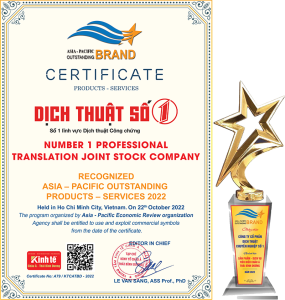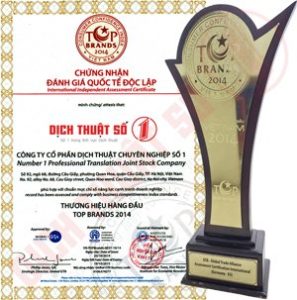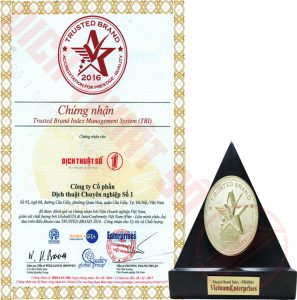In legal, academic, and immigration-related procedures in Canada, translations must not only be accurate but also legally certified. In Canada, CTTIC certification is regarded as one of the most prestigious standards, ensuring both the translator’s professional competence and the legal validity of the translation.
So, what is the CTTIC certification, and why is certified translation in Canada so crucial? In this article, Dịch Thuật Số 1 provides you with all the essential information you need to know.
👉 See also: What is NAATI Certified Translation?
What is CTTIC?
CTTIC (Canadian Translators, Terminologists and Interpreters Council) is the leading organization representing language professionals in Canada. As the umbrella body connecting provincial and territorial translation associations, CTTIC authorizes its member associations to assess and certify translators. While CTTIC itself does not issue certificates directly, it serves as the national professional oversight body.
A CTTIC-certified translation is a testament to the translator’s high professional competence and ethical standards. Recognized by the Canadian government, courts, immigration offices, universities, and various public and private institutions, the CTTIC certification has become the gold standard in the Canadian translation industry.
👉 See also: What is ATA Certified Translation? Trusted International Service by Dịch Thuật Số 1
Why Choose CTTIC Certified Translations?
Here are the key reasons why you should opt for CTTIC-certified translations:
- Widely Accepted in Canada: CTTIC-certified translations are generally accepted by immigration offices, courts, universities, and government agencies without the need for further verification, ensuring legal validity.
- Guaranteed Quality by Experts: CTTIC-certified translators have undergone strict assessments or standardized exams, ensuring high accuracy, industry-appropriate language, and faithful content.
- Higher Approval Rates: Visa, study, immigration, and international job applications are processed faster and are less likely to be delayed or rejected when supported by certified translations.
- Reduced Legal Risks: Certified translations minimize the risk of rejection due to linguistic errors or lack of legal validity.
👉 See also: The 6 Most Common Professional Translation Certifications Today
Types of Documents Requiring CTTIC Certified Translation
CTTIC-certified translation is often mandatory for documents submitted in Canada, particularly for immigration, education, employment, and commercial purposes. These translations must be carried out by certified CTTIC members and meet strict legal standards.
Common types of documents requiring CTTIC certified translation include:
- Visa, Study, and Immigration Applications: Personal ID documents, invitation letters, financial statements, proof of family relationships, etc.
- Personal Legal Documents: Birth certificates, marriage certificates, divorce decrees, criminal record checks, household registration, national ID/passport.
- Diplomas and Academic Transcripts: For education or degree recognition in Canada – includes diplomas, transcripts, report cards, etc.
- Business Contracts and Notarized Documents: Companies expanding into the Canadian market often require translation of partnership agreements, company charters, business licenses, legal documents, etc.
- Medical Records, Employment Documents, and Recommendation Letters: For work visa applicants – includes employment history, reference letters, medical reports.
👉 See also: Certified Translation, Notarized Copies, and Contract Notarization
CTTIC Certified Translation Process at Dịch Thuật Số 1
At Dịch Thuật Số 1, we follow a strict translation process that meets CTTIC standards, ensuring both legal compliance and broad acceptance in Canada. Below are the four professional steps we follow for optimal speed and accuracy:
1. Document Intake and Language Consultation
Documents can be submitted via email, in person, or online. Our experts assess the document type, usage purpose, and required languages (e.g., English, French) to offer suitable guidance based on Canadian authority requirements.
2. Assignment to CTTIC-Certified Translator
Only translators recognized by provincial CTTIC member organizations such as OTTIAQ (Québec), ATIO (Ontario), STIBC (British Columbia), etc., are assigned to the task – ensuring legal validity.
3. Editing, Proofreading, and Certification
The translation is professionally edited and proofread by language experts. It is then signed and stamped in accordance with CTTIC standards. We also provide consular legalization and notarization upon request.
4. Delivery and Free Revisions (if needed)
Clients receive both hard copies and/or soft copies (PDF). If the receiving institution requires changes, we provide free revisions until acceptance.
Our Commitment at Dịch Thuật Số 1
- Team of professional translators recognized by CTTIC
- Fast turnaround, on-time delivery – nationwide shipping
- Multilingual service: English – French – Chinese – Spanish – Korean – Japanese
- Money-back guarantee if translation does not meet requirements
- Free consultation – revisions until approved
👉 See also: Fast Certified Translation Services
Frequently Asked Questions (FAQ)
1. Must the translator be a CTTIC member?
Yes. For a translation to be officially certified by CTTIC, the translator must be a recognized and valid member of a CTTIC-affiliated association such as OTTIAQ (Québec), STIBC (British Columbia), ATIA (Alberta), etc. These associations are authorized to issue certifications, ensuring that translators meet the highest professional standards in Canada.
2. How long does it take to complete a CTTIC certified translation?
Typically, CTTIC-certified translations take 2–5 business days, depending on the document’s length and complexity. At Dịch Thuật Số 1, we can expedite common documents within 24–72 hours. Priority and express services are also available upon request.
3. Is government notarization required after translation?
In many cases, additional government notarization is not required if the translation is done and certified by a CTTIC member translator. However, certain Canadian or international institutions may request notarization for added legal assurance. Dịch Thuật Số 1 supports clients in completing documentation according to each country’s or agency’s specific requirements.
4. What’s the difference between CTTIC and ATA?
CTTIC is Canada’s national authority, while ATA (American Translators Association) is the certification body in the U.S. Both require translators to pass rigorous exams and adhere to ethical standards.
However, CTTIC is primarily used for legal, academic, and immigration purposes in Canada, while ATA certification is recognized in the U.S. The choice depends on your target country’s requirements.
👉 See also: Express Certified Translation Services
Conclusion: Ensure Quality with CTTIC Certified Translation
With the increasing demand for immigration, education, and employment in Canada, CTTIC certified translation is not just a requirement – it is a key factor in ensuring the legal validity, professionalism, and accuracy of international documentation.
Recognized by Canadian government bodies, educational institutions, and legal professionals, CTTIC certified translations act as your “passport” for faster processing and successful application outcomes.
If you’re looking for a trusted, experienced translation provider well-versed in CTTIC standards, Dịch Thuật Số 1 is your go-to choice. We are committed to delivering Canada-standard service – precise, fast, and fully confidential.








